最新2017河北中考英语时态考点梳理含答案
2017年河北省英语中考真题(含答案)
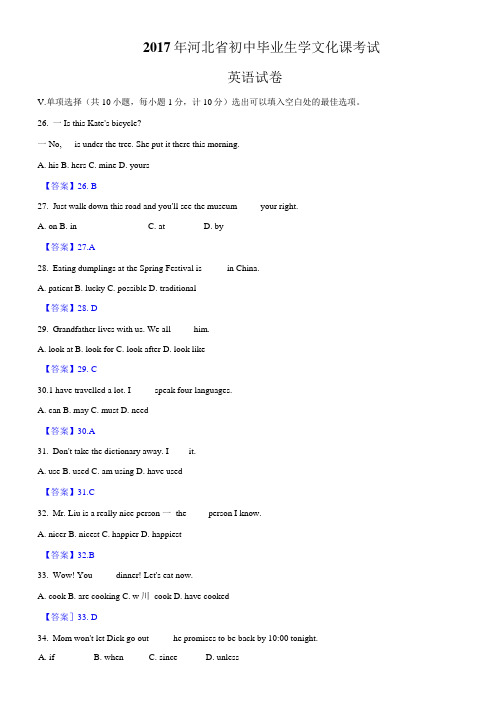
2017年河北省初中毕业生学文化课考试英语试卷V.单项选择(共10小题,每小题1分,计10分)选出可以填入空白处的最佳选项。
26.一Is this Kate's bicycle?一No, __ is under the tree. She put it there this morning.A. hisB. hersC. mineD. yours【答案】26. B27.Just walk down this road and you'll see the museum _____ y our right.A. onB. inC. atD. by【答案】27.A28.Eating dumplings at the Spring Festival is ____ in China.A. patientB. luckyC. possibleD. traditional【答案】28. D29.Grandfather lives with us. We all ____ him.A. look atB. look forC. look afterD. look like【答案】29. C30.1 have travelled a lot. I ____ speak four languages.A. canB. mayC. mustD. need【答案】30.A31.Don't take the dictionary away. I ____ i t.A. useB. usedC. am usingD. have used【答案】31.C32.Mr. Liu is a really nice person 一the ____ person I know.A. nicerB. nicestC. happierD. happiest【答案】32.B33.Wow! You ____ dinner! Let's eat now.A. cookB. are cookingC. w川cookD. have cooked【答案]33. D34.Mom won't let Dick go out ____ he promises to be back by 10:00 tonight.A. ifB. whenC. sinceD. unless【答案】34.D35.Hangzhou ______ as the City of Silk. Tourists like shopping for silk there.A.knowsB. is knownC. was knownD. will be known【答案】35.BVL完形填空(共10小题,每小题1分,计10分)阅读下面短文,掌握其大意,然后从各小题所给的四个选项中选出最佳选项。
(河北专版)2017春中考英语命题研究第二部分语法专题突资料

专题十动词的时态, 河北中考五年命题规律及趋向1. 此刻进行时2. 一般此刻时3. 一般过去时考大纲求一般未来时4.5. 过去进行时6. 此刻达成时时态年份题号选项设置提示词分值一般此刻时wears /wore/hwhen he201633as worn/was 1 分readswearingwins /won/wil201536l win/has every time 1 分wonarrives /arri as soon as 指引的时间状ved/is201335语从句按照 1 分arrivi ng /wi“主将从现”ll arrive原则一般过去时leave/ left/w201632ill无 1 分leave/wasleavingcomes/ came/i201440s coming/was无 1 分comingleft /leaves/201337is无 1 分leaving/wasleavingdo;get/ did ;201241get /will;无 1 分get/have;got一般未来时see/saw/has201635seen/ will__s无 1 分eego to/went201531to/have gone无 1 分to/ am__going__totalk/talked/this201439will__talk/h 1 分afternoonave talkedgo/went/will201333__go/was无 1 分going此刻进行时willbecome/becam201534e/ is__becomi these years 1 分ng/wasbecomingknocks/knock201437ed/ is__knock无 1 分ing /wasknockingwilldrive/are__d201336riving/were无 1 分driving/havedriven过去进行时sits/sat/is201537sitting/was_无 1 分_sittinginterviews/interviewed/201444has无 1 分interviewed/was__i nterviewinghaveenjoyed/will201345enjoy/are all night 1 分enjoying/were__enjoyingwill shop/am201243shopping/was this morning 1 分__shopping /have shopped此刻达成时willget/ has__got201636/is无 1 分getting/wasgettingfinds/found/201532has__found /w无 1 分ill find201442pass/ have__p无 1 分assed /willpass/arepassingdon't watch/won't201343watch/ haven'无 1 分t__watched /wasn'twatchingreceived/will201240receive/was无 1 分receiving/has__received动词的时态是河北中考单项选择题中的高频考点。
河北省2017年中考英语试题及答案

2017年河北省初中毕业生升学文化课考试英语试卷听力部分(第一节)I.听句子,选出句子中所包含的信息。
(共5小题,每小题1分,计5分)1. A. cat B. cap C. cup2. A. try on B. turn on C. put on3. A. September 2nd B. November 22nd C. December 27th4. A. I’ll invite him to the party. B. I like the drinks at the party. C. I’ll provide drinks for the party.5. A. People were angry with the players.B. People were happy to join the players.C. People were excited to see the players.II.听句子,选出该句的最佳答语。
(共5小题,每小题1分,计5分)6. A. I’m fine. B. I’m reading. C. I’m nineteen7. A. Sure. B. Good idea. C. Many thanks.8. A. That’s great. B. Never mind. C. You’re welcome.9. A. It’s clean. B. It’s getting dark. C. It’s very hot.10. A. Sorry, I don’t know. B. Yes, I think so. C. No, I don’t feel well.III.听对话和问题,选择正确的选项。
(共8小题,每小题1分,计8分)11. What will the woman get for the man?A. B. C.12. Where is Jane now?A. B. C.-------------------------------------------------------------------------------------------------------------------------------------------13. What does Peter want to do?A. Help to cook.B. Set the table.C. Wash the dishes.14. Why doesn’t Mom let Peter help her at first?A. The work is afraid home.B. Peter has something to do.C. She thinks h e’s too young.-------------------------------------------------------------------------------------------------------------------------------------------15. Who speaks English best?A. Lucy.B. Mark.C. Lily.16. What will Lucy do if she has no one to talk to?A. Take to herself.B. Practice with Lily.C. Study in a university.17. What does Mark think of Lucy’s learning method?A. Popular.B. Creative.C. Interesting.18. When did Lucy start practicing this way?A. Half a year ago.B. Two years ago.C. Two and a half years ago.IV.听短文和问题,选择正确答案。
河北省2017年中考英语试题及答案
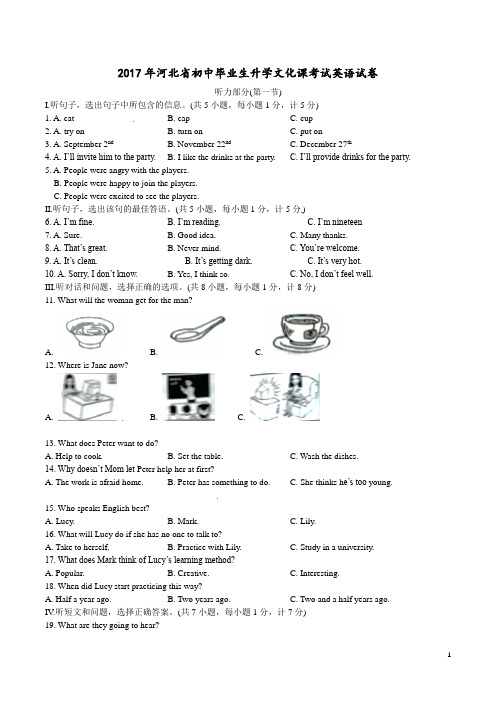
2017年河北省初中毕业生升学文化课考试英语试卷听力部分(第一节)I.听句子,选出句子中所包含的信息。
(共5小题,每小题1分,计5分)1. A. cat B. cap C. cup2. A. try on B. turn on C. put on3. A. September 2nd B. November 22nd C. December 27th4. A. I’ll invite him to the party. B. I like the drinks at the party. C. I’ll provide drinks for the party.5. A. People were angry with the players.B. People were happy to join the players.C. People were excited to see the players.II.听句子,选出该句的最佳答语。
(共5小题,每小题1分,计5分)6. A. I’m fine. B. I’m reading. C. I’m nineteen7. A. Sure. B. Good idea. C. Many thanks.8. A. That’s great. B. Never mind. C. You’re welcome.9. A. It’s clean. B. It’s getting dark. C. It’s very hot.10. A. Sorry, I don’t know. B. Yes, I think so. C. No, I don’t feel well.III.听对话和问题,选择正确的选项。
(共8小题,每小题1分,计8分)11. What will the woman get for the man?A. B. C.12. Where is Jane now?A. B. C.-------------------------------------------------------------------------------------------------------------------------------------------13. What does Peter want to do?A. Help to cook.B. Set the table.C. Wash the dishes.14. Why doesn’t Mom let Peter help her at first?A. The work is afraid home.B. Peter has something to do.C. She thinks h e’s too young.-------------------------------------------------------------------------------------------------------------------------------------------15. Who speaks English best?A. Lucy.B. Mark.C. Lily.16. What will Lucy do if she has no one to talk to?A. Take to herself.B. Practice with Lily.C. Study in a university.17. What does Mark think of Lucy’s learning method?A. Popular.B. Creative.C. Interesting.18. When did Lucy start practicing this way?A. Half a year ago.B. Two years ago.C. Two and a half years ago.IV.听短文和问题,选择正确答案。
河北省2017年中考英语试题含答案

2017年河北省初中毕业生升学文化课考试英语试卷听力部分(第一节)I.听句子,选出句子中所包含的信息。
(共5小题,每小题1分,计5分)1. A. cat B. cap C. cup2. A. try on B. turn on C. put on3. A. September 2nd B. November 22nd C. December 27th4. A. I’ll invite him to the party. B. I like the drinks at the party. C. I’ll provide drinks for the party.5. A. People were angry with the players.B. People were happy to join the players.C. People were excited to see the players.II.听句子,选出该句的最佳答语。
(共5小题,每小题1分,计5分)6. A. I’m fine. B. I’m reading. C. I’m nineteen7. A. Sure. B. Good idea. C. Many thanks.8. A. That’s great. B. Never mind. C. You’re welcome.9. A. It’s clean. B. It’s getting dark. C. It’s very hot.10. A. Sorry, I don’t know. B. Yes, I think so. C. No, I don’t feel well.III.听对话和问题,选择正确的选项。
(共8小题,每小题1分,计8分)11. What will the woman get for the man?A. B. C.12. Where is Jane now?A. B. C.-------------------------------------------------------------------------------------------------------------------------------------------13. What does Peter want to do?A. Help to cook.B. Set the table.C. Wash the dishes.14. Why doesn’t Mom let Peter help her at first?A. The work is afraid home.B. Peter has something to do.C. She thinks h e’s too young.-------------------------------------------------------------------------------------------------------------------------------------------15. Who speaks English best?A. Lucy.B. Mark.C. Lily.16. What will Lucy do if she has no one to talk to?A. Take to herself.B. Practice with Lily.C. Study in a university.17. What does Mark think of Lucy’s learning method?A. Popular.B. Creative.C. Interesting.18. When did Lucy start practicing this way?A. Half a year ago.B. Two years ago.C. Two and a half years ago.IV.听短文和问题,选择正确答案。
2017年河北省中考英语试卷-答案

河北省2017年初中毕业生升学文化课考试英语答案解析卷Ⅰ听力部分(第一节)Ⅰ.听句子,选出句子中所包含的信息。
1.【答案】A2.【答案】A3.【答案】B4.【答案】C5.【答案】CⅡ. 听句子,选出该句的最佳答语。
6.【答案】A7.【答案】A8.【答案】B9.【答案】C10.【答案】BⅢ. 听对话和问题,选择正确答案。
11.【答案】B12.【答案】B13.【答案】A14.【答案】C15.【答案】C16.【答案】A17.【答案】B18.【答案】CⅣ. 听短文和问题,选择正确答案。
19.【答案】B20.【答案】B22.【答案】C23.【答案】A24.【答案】A25.【答案】B笔试部分Ⅴ. 单项选择题26.【答案】B【解析】句意:这是Kate的自行车吗?不是,她的自行车在树下。
她今天早晨放在那儿的。
分析句子结构可知,空格处在句中做主语,指代“She”,应用名词性物主代词here,相当于her bike。
故B项正确。
【考点】人称代词辨析27.【答案】A【解析】句意:沿着这条路走,你会在你的右侧看到博物馆。
o n one’s right为固定搭配,意为“在某人的右侧”。
故A项正确。
【考点】介词辨析28.【答案】D【解析】句意:春节吃饺子是中国的传统。
D项意为“传统的”,符合句意。
故D项正确。
A项意为“耐心”;B项意为“幸运的”;C项意为“可能的”,都与句意不符。
【考点】形容词辨析29.【答案】C【解析】句意:爷爷和我们住在一起。
我们所有人都照顾他。
C项意为“照顾,照看”,符合题意。
故C项正确。
A项意为“看”;B项意为“寻找”;D项意为“看起来像”,都与句意不符。
【考点】动词短语辨析30.【答案】A【解析】句意:我经常旅游。
我会讲四种语言。
根据句意可知,空格处表示能力。
A项意为“能,会”,符合题意。
故A项正确。
B项意为“可能”;C项意为“必须”;D项意为“需要”,都与句意不符。
【考点】情态动词辨析31.【答案】C【解析】句意:别把字典拿走,我正在用呢。
2017年河北省中考英语试题及答案

2017年河北省初中毕业生升学文化课考试英语试卷听力部分(第一节)I.听句子,选出句子中所包含的信息。
(共5小题,每小题1分,计5分)1. A. cat B. cap C. cup2. A. try on B. turn on C. put on3. A. September 2nd B. November 22nd C. December 27th4. A. I’ll invite him to the party.B. I like the drinks at the party.C. I’ll provide drinks for the party.5. A. People were angry with the players.B. People were happy to join the players.C. People were excited to see the players.II.听句子,选出该句的最佳答语。
(共5小题,每小题1分,计5分)6. A. I’m fine. B. I’m reading. C. I’m nineteen.7. A. Sure. B. Good idea. C. Many thanks.8. A. That’s great. B. Never mind. C. You’re welcome.9. A. It’s clean. B. It’s getting dark. C. It’s very hot.10. A. Sorry, I don’t know. B. Yes, I think so. C. No, I don’t feel well.III.听对话和问题,选择正确的选项。
(共8小题,每小题1分,计8分)11. What will the woman get for the man?B. C.12. Where is Jane now?A. B. C.---------------------------------------------------------------------------------------------------------------------------13. What does Peter want to do?A. Help to cook.B. Set the table.C. Wash the dishes.14. Why doesn’t Mom let Peter help her at first?A. The work is afraid home.B. Peter has something to do.C. She thinks he’s too young.---------------------------------------------------------------------------------------------------------------------------15. Who speaks English best?A. Lucy.B. Mark.C. Lily.16. What will Lucy do if she has no one to talk to?A. Take to herself.B. Practice with Lily.C. Study in a university. 17. What does Mark think of Lucy’s learning method?A. Popular.B. Creative.C. Interesting.18. When did Lucy start practicing this way?A. Half a year ago.B. Two years ago.C. Two and a half years ago. IV.听短文和问题,选择正确答案。
2017年河北省中考英语试卷及答案含听力河北省2017年中考英语试题(原卷)
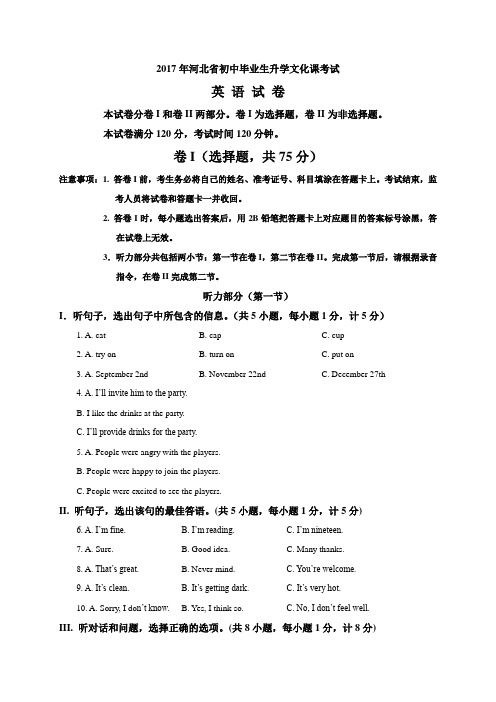
2017年河北省初中毕业生升学文化课考试英语试卷本试卷分卷I和卷II两部分。
卷I为选择题,卷II为非选择题。
本试卷满分120分,考试时间120分钟。
卷I(选择题,共75分)注意事项:1. 答卷I前,考生务必将自己的姓名、准考证号、科目填涂在答题卡上。
考试结束,监考人员将试卷和答题卡一并收回。
2. 答卷I时,每小题选出答案后,用2B铅笔把答题卡上对应题目的答案标号涂黑,答在试卷上无效。
3.听力部分共包括两小节:第一节在卷I,第二节在卷II。
完成第一节后,请根据录音指令,在卷II完成第二节。
听力部分(第一节)I.听句子,选出句子中所包含的信息。
(共5小题,每小题1分,计5分)1. A. cat B. cap C. cup2. A. try on B. turn on C. put on3. A. September 2nd B. November 22nd C. December 27th4. A. I’ll invite him to the party.B. I like the drinks at the party.C. I’ll provide drinks for the party.5. A. People were angry with the players.B. People were happy to join the players.C. People were excited to see the players.II. 听句子,选出该句的最佳答语。
(共5小题,每小题1分,计5分)6. A. I’m fine. B. I’m reading. C. I’m nineteen.7. A. Sure. B. Good idea. C. Many thanks.8. A. That’s great. B. Never mind. C. You’re welcome.9. A. It’s clean. B. It’s getting dark. C. It’s very hot.10. A. Sorry, I do n’t know. B. Yes, I think so. C. No, I don’t feel well.III. 听对话和问题,选择正确的选项。
河北省2017年中考英语试题及答案

2017年河北省初中毕业生升学文化课考试英语试卷听力部分(第一节)I.听句子,选出句子中所包含的信息。
(共5小题,每小题1分,计5分)1. A. cat B. cap C. cup2. A. try on B. turn on C. put on3. A. September 2nd B. November 22nd C. December 27th4. A. I’ll invite him to the party. B. I like the drinks at the party. C. I’ll provide drinks for the party.5. A. People were angry with the players.B. People were happy to join the players.C. People were excited to see the players.II.听句子,选出该句的最佳答语。
(共5小题,每小题1分,计5分)6. A. I’m fine. B. I’m reading. C. I’m nineteen7. A. Sure. B. Good idea. C. Many thanks.8. A. That’s great. B. Never mind. C. You’re welcome.9. A. It’s clean. B. It’s getting dark. C. It’s very hot.10. A. Sorry, I don’t know. B. Yes, I think so. C. No, I don’t feel well.III.听对话和问题,选择正确的选项。
(共8小题,每小题1分,计8分)11. What will the woman get for the man?A. B. C.12. Where is Jane now?A. B. C.-------------------------------------------------------------------------------------------------------------------------------------------13. What does Peter want to do?A. Help to cook.B. Set the table.C. Wash the dishes.14. Why doesn’t Mom let Peter help her at first?A. The work is afraid home.B. Peter has something to do.C. She thinks h e’s too young.-------------------------------------------------------------------------------------------------------------------------------------------15. Who speaks English best?A. Lucy.B. Mark.C. Lily.16. What will Lucy do if she has no one to talk to?A. Take to herself.B. Practice with Lily.C. Study in a university.17. What does Mark think of Lucy’s learning method?A. Popular.B. Creative.C. Interesting.18. When did Lucy start practicing this way?A. Half a year ago.B. Two years ago.C. Two and a half years ago.IV.听短文和问题,选择正确答案。
2017年河北省中考英语试卷附答案解析[Word版]
![2017年河北省中考英语试卷附答案解析[Word版]](https://img.taocdn.com/s3/m/69e80ef880eb6294dc886c20.png)
河北省2017年中考英语试卷笔试部分V.单项选择(共10小题,每小题1分,计10分)先出可以填入空白处的最佳选项。
26. ---Is this Kate’s bicycle?---No, ________ is under the tree. She put it there this morning.A. hisB. hersC. mineD. yours答案 B,考查名词性物主代词。
Hers =her bicycle。
27. Just walk down this road and you’ll see the museum ________ your right.A. onB. inC. atD. by答案 A. 考查介词。
表达在左边或右边,用介词on。
28. Eating dumplings at the Spring Festival is ________ in China.A. patientB. luckyC. possibleD. traditional答案 D。
考查形容词。
句意: 在中国,春节时吃饺子是传统的。
A耐心的, B幸运的,C 可能的,D 传统的。
29. Grandfather lives with us. We all ________ him.A. look atB. look forC. look afterD. look like 答案 C。
考查动词短语。
句意:爷爷和我们一起住,我们都照顾他。
A 看, B 寻找, C 照顾,D看起来像。
30. I have travelled a lot. I ________ speak four languages.A. canB. mayC. mustD. need答案A. 考查表示能力的情态动词。
句意:我经常旅游。
我能说四门语言。
31. Don’t take the dictionary away. I ________ it.A. useB. usedC. am usingD. have used答案C。
河北省石家庄创新国际学校2017届中考英语总复习 动词时态(II)专项练习含答案
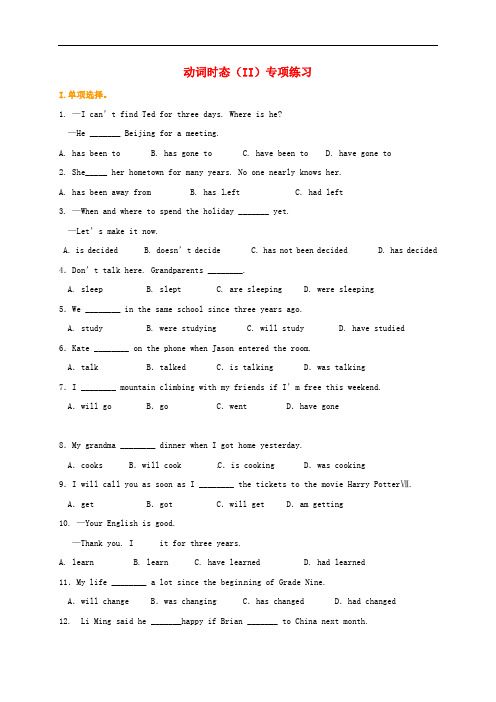
动词时态(II)专项练习I.单项选择。
1. —I can’t find Ted for three days. Where is he?—He _______ Beijing for a meeting.A. has been toB. has gone toC. have been toD. have gone to2. She_____ her hometown for many years. No one nearly knows her.A. has been away fromB. has l eftC. had left3. —When and where to spend the holiday _______ yet.—Let’s make it now.A. is decidedB. doesn’t decideC. has not been decidedD. has decided 4.Don’t talk here. Grandparents ________.A. sleepB. sleptC. are sleepingD. were sleeping5.We ________ in the same school since three years ago.A. studyB. were studyingC. will studyD. have studied 6.Kate ________ on the phone when Jason entered the room.A.talk B.talked C.is talking D.was talking7.I ________ mountain climbing with my friends if I’m free this weekend.A.will go B.go C.went D.have gone8.My grandma ________ dinner when I got home yesterday.A.cooks B.will cook C.is cooking D.was cooking9.I will call you as soon as I ________ the tickets to the movie Harry PotterⅦ.A.get B.got C.will get D.am getting10. —Your English is good.—Thank you. I it for three years.A. learnB. learnC. have learnedD. had learned11.My life ________ a lot since the begin ning of Grade Nine.A.will change B.was changing C.has changed D.had changed12. Li Ming said he _______happy if Brian _______ to China next month.A. as; comeB. was; would comeC. would be; cameD. will be; come13.If it ________ tomorrow, we won’t go to the park.A.rained B. rains C.will rain D. raining14. —The plane is leaving right now, but Jim hasn’t arrived yet.—Well, he said he _____here on time.A. cameB. would comeC. can beD. will be15.The other day I ______ a letter from my uncle.A.got B.will got C.have got D.get16. — What had happened over there?—I don’t know. By the time I got there, all the people ________ off.A.had run B.have run C.were running17. As soon as the baby saw her mother, she ________.A .was going to cry B. cried C. began to cry D. was crying18. —Where i s your father?—He_________ Australia and he _______ Sydney for two weeks.A. has been to; has been inB. has gone to; has been inC. has been in; has been toD. has gone to; has been to19. Jenny _____in the chicken when you called her at 5 o’clock this afternoon.A. is cookingB. was cookingC. cooksD. coo ked20. —You were not in when I went there yesterday.—Oh, I _______ for a friend from England at the airport at that moment.A. had waitedB. was waitingC. am waitingD. have waitedII.用所给动词的适当形式完成下列句子。
2017年河北省中考英语试卷附答案解析[Word版]
![2017年河北省中考英语试卷附答案解析[Word版]](https://img.taocdn.com/s3/m/95849f1aad51f01dc381f1a3.png)
河北省2017年中考英语试卷笔试部分V.单项选择(共10小题,每小题1分,计10分) 先出可以填入空白处的最佳选项。
26. --- Is this Kate ' s bicycle?---No, _______ is un der the tree. She put it there this morning. A. hisB. hersC. mineD. yours答案B , 考查名词性物主代词。
Hers =her bicycle 。
27. Just walk down this road and you ' II see the museum _____________ y our right. A. onB. inC. at 答案A.考查介词。
表达在左边或右边,用介词on 。
28. Eat ing dumpli ngs at the Spring Festival is ______ i n China.照顾,D 看起来像。
答案A.考查表示能力的情态动词。
句意:我经常旅游。
31. Don ' t take the dictionary away. I ________ i t. A. useB. usedC. am usingD. have used答案Co 考查时态。
句意:别把字典拿走,我将于使用它。
一般现在时代替将来。
32. Mr. Liu is a really nice pers on --- the _______ pers on I know. A. nicer B. ni cestC. happierD. happiest答案 D 。
考查形容词最高级。
句意刘先生真是一个很棒的人,我见过的最快乐的人°iD. byA. patie nt traditiB. luckyC. possibleD.答案D 。
考查形容词。
句意:在中国,春节时吃饺子是传统的。
(完整版)最新2017河北中考英语时态考点梳理含答案

中考时态考点梳理动词时态是各地中考试题中必考的知识点,也是考查的重点。
然而,初中英语时态多达八种,并且近几年中考在考查时态时,形式灵活多样,尤其是我们河北省近几年的中考,多体现在上下文语境中,这样无形中就增加了试题的难度,使得一些考生总感觉时态题不可捉摸,无规律可循。
其实,你只要弄清楚了时态题的命题方法和解题方法,也就不难了。
一、巧抓时间标志词,快解时态题由于绝大多数的中考英语试卷同时具有毕业检测与升学选拔的双重功效,所以对时态的考查在很大程度上还是停留在识记和简单应用的层次上。
为此,命题人在命题时,往往会借助一些关键的时间标志词来给考生以解题的“暗示”。
所以,同学们在解题时,应该抓住关键“时间类标志词”,从而达到快解时态题的“神效”。
【中考例题】1. (2015陕西) Many city people ______ their bikes to work every day.A. rideB. will rideC. rodeD. have ridden2. (2015武汉) —A nice car! Is it yours?—No, it isn’t. I ______ it from a friend of mine two days ago.A. borrowB. have borrowedC. will borrowD. borrowed3. (2015黄石) The writer and speaker ______ a speech on Chinese culture in the hall now.A. are givingB. is givingC. will giveD. has given4. (2015齐齐哈尔) Alice ______ for the bus at seven yesterday morning.A. waitedB. was waitingC. is waitingD. will wait5. (2015福州) So far, the AIIB (亚投行) ______ 57 countries to be the founding members.A. attractedB. has attractedC. will attractD. is attracting6. (2015龙东) By the time I got back to school, the bell ______.A. rangB. has rungC. had rungD. will ring7. (2015抚顺) —Why are you so happy? —My friend ______ me next month.A. visitsB. was visitingC. will visitD. visited【知识锦囊】【应试对策】中考测试动词时态必须与句中时间状语一致时,常在题干中加入具体的交际情景,以测试学生对动词时态知识的实际运用能力。
河北省2017年中考英语试题(含答案)
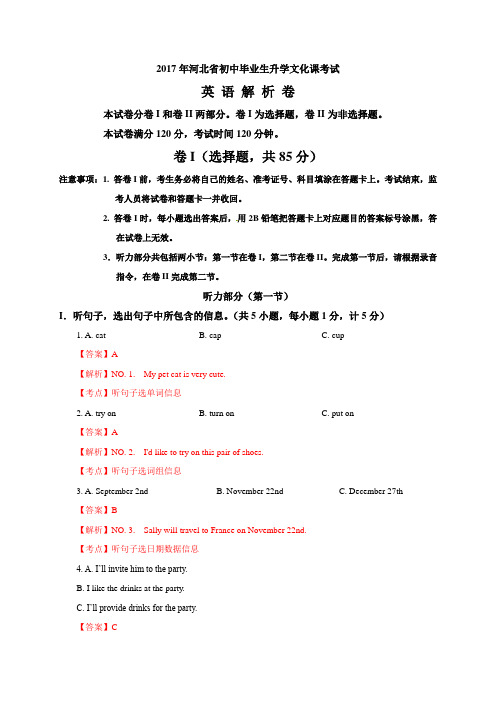
2017年河北省初中毕业生升学文化课考试英语解析卷本试卷分卷I和卷II两部分。
卷I为选择题,卷II为非选择题。
本试卷满分120分,考试时间120分钟。
卷I(选择题,共85分)注意事项:1. 答卷I前,考生务必将自己的姓名、准考证号、科目填涂在答题卡上。
考试结束,监考人员将试卷和答题卡一并收回。
2. 答卷I时,每小题选出答案后,用2B铅笔把答题卡上对应题目的答案标号涂黑,答在试卷上无效。
3.听力部分共包括两小节:第一节在卷I,第二节在卷II。
完成第一节后,请根据录音指令,在卷II完成第二节。
听力部分(第一节)I.听句子,选出句子中所包含的信息。
(共5小题,每小题1分,计5分)1. A. cat B. cap C. cup【答案】A【解析】NO. 1. My pet cat is very cute.【考点】听句子选单词信息2. A. try on B. turn on C. put on【答案】A【解析】NO. 2. I'd like to try on this pair of shoes.【考点】听句子选词组信息3. A. September 2nd B. November 22nd C. December 27th【答案】B【解析】NO. 3. Sally will travel to France on November 22nd.【考点】听句子选日期数据信息4. A. I’ll invite him to the party.B. I like the drinks at the party.C. I’ll provide drinks for the party.【答案】C【解析】NO. 4. I’ll pro vide you with drinks at the party. Provide sb. with sth. = provide sth. for sb.【考点】听句子选同义句5. A. People were angry with the players.B. People were happy to join the players.C. People were excited to see the players.【答案】C【解析】NO. 5. Peo ple be gan to cheer as the players passed by. (运动员经过时,人们开始欢呼。
河北中考英语动词时态专题知识点讲解+同步练习试题 (共51张ppt)

me again?
A. what you say
B. what do you say
C. what you said
D. what did you say
【方法点拨】第①步:分析选项可知本题考查
宾语从句的语
序及时态。宾语从句需用陈述句语序,排除B、 D项;第②步:
(3)在主从复合句中,如果主句和从句的谓语 动词表示的两个动作都发生在过去,而且没有明
三、一般将来时(6年3考) 结构:1. 主语+will/shall +动词原形+其他(表
示对未来或事实的预测) 2. 主语+am/is/are going to +动词原形 (表示打
算、计划、愿意做某事,也可用来表示自然现象) 3. 主语+am/is/are+动词现在分词(常用于这种
结构的动词有come, go, leave, arrive, start, begin 等,表示即将发生或安排好的要做的事情。)
Look! Some birds are flying in the sky. 看!一
2. 表示现阶段正在进行的动作或持续的状态。 (6年3考)如:
Scientists are now trying to make robots look like humans and do the same things as us. 科学家们现在正努力使机器人看起来像人类, 并做和我们一样的事情。
“主将从现”原则,
即主句用一般将来时,从句用一般现在时。故
(2)“时态一致”原则。在含有宾语从句的主
从复合句中,当主句的谓语动词为过去时态时,
从句的谓语动词需用相应的某种过②去________时 态。
例 I didn’t pay attention to ________. Could
2017年河北省中考英语试题及参考答案(word解析版)
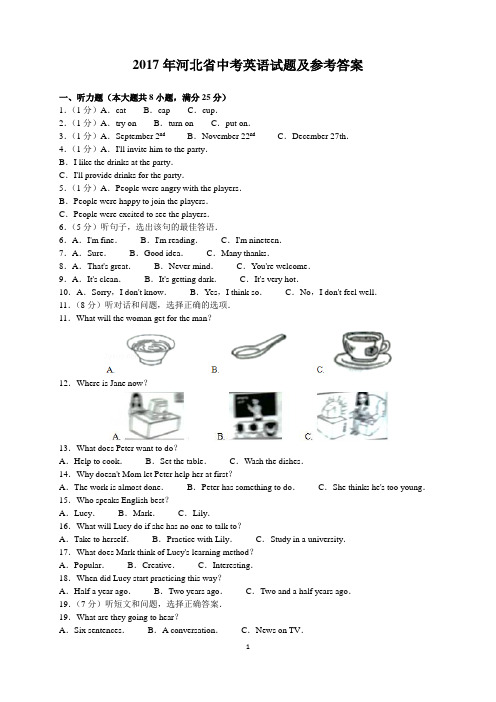
2017年河北省中考英语试题及参考答案一、听力题(本大题共8小题,满分25分)1.(1分)A.cat B.cap C.cup.2.(1分)A.try on B.turn on C.put on.3.(1分)A.September 2nd B.November 22nd C.December 27th.4.(1分)A.I'll invite him to the party.B.I like the drinks at the party.C.I'll provide drinks for the party.5.(1分)A.People were angry with the players.B.People were happy to join the players.C.People were excited to see the players.6.(5分)听句子,选出该句的最佳答语.6.A.I'm fine.B.I'm reading.C.I'm nineteen.7.A.Sure.B.Good idea.C.Many thanks.8.A.That's great.B.Never mind.C.You're welcome.9.A.It's clean.B.It's getting dark.C.It's very hot.10.A.Sorry,I don't know.B.Yes,I think so.C.No,I don't feel well.11.(8分)听对话和问题,选择正确的选项.11.What will the woman get for the man?12.Where is Jane now?13.What does Peter want to do?A.Help to cook.B.Set the table.C.Wash the dishes.14.Why doesn't Mom let Peter help her at first?A.The work is almost done.B.Peter has something to do.C.She thinks he's too young.15.Who speaks English best?A.Lucy.B.Mark.C.Lily.16.What will Lucy do if she has no one to talk to?A.Take to herself.B.Practice with Lily.C.Study in a university.17.What does Mark think of Lucy's learning method?A.Popular.B.Creative.C.Interesting.18.When did Lucy start practicing this way?A.Half a year ago.B.Two years ago.C.Two and a half years ago.19.(7分)听短文和问题,选择正确答案.19.What are they going to hear?A.Six sentences.B.A conversation.C.News on TV.20.Which letter should they choose if the sentence is correct?A.N.B.A.C.B21.How long will they look at the questions before listening?A.Three seconds.B.Four seconds.C.Twenty seconds.22.When do they have courses in the Star Theater School?A.Every day.B.Every weekend.C.During school holidays.23.At what age can the children go to the Star Theater School?A.Between 9 and 16.B.Between 5 and 16.C.Between 14 and 17.24.How much are the courses for 15﹣year﹣old kids?A.$75 a month.B.$50 a month.C.$85 a month.25.What do they offer for free?A.Clothes.B.Books.C.Lunch.二、选择题(本大题共10小题,每小题1分,满分10分)26.(1分)﹣﹣﹣Is this Kate's bicycle?﹣﹣﹣No,________ is under the tree.She put it there this morning.()A.his B.hers C.mine D.yours27.(1分)Just walk down this road and you'll see the museum ________ your right.()A.on B.in C.at D.by28.(1分)Eating dumplings at the Spring Festival is ________ in China.()A.patient B.lucky C.possible D.traditional29.(1分)Grandfather lives with us.We all ________ him.()A.look at B.look for C.look after D.look like30.(1分)I have travelled a lot.I ________ speak four languages.()A.can B.may C.must D.need31.(1分)Don't take the dictionary away.I ________ it.()A.use B.used C.am using D.have used32.(1分)Mr.Liu is a really nice person﹣﹣﹣the ________ person I know.()A.nicer B.nicest C.happier D.happiest33.(1分)Wow!You ________ dinner!Let's eat now.()A.cook B.are cooking C.will cook D.have cooked34.(1分)Mom won't let Dick go out ________ he promises to be back by 10:00 tonight.()A.if B.when C.since D.unless35.(1分)Hangzhou ________ as the City of Silk.Tourists like shopping for silk there.()A.knows B.is known C.was known D.will be known完形填空阅读下面短文,掌握其大意,然后从各小题所给的四个选项中选出最佳选项.36.(10分)One thorn(刺)of experience is worth many times of warning.Ralph Wick was seven years old.In most things he was a fine boy,but he would cry from time to time.When he could not have what he wanted,he would (36)for it.If he was told that it would hurt him,and he could not (37)it,he would also cry.One day,he went with his mother into the (38).The sun shone.The grass was cut.The flowers were starting to come out.Ralph thought he was,for once,a good boy.A (39)was on his face.He wished to do as he was told.Ralph helped his mother with the farm work and he was very happy."Now you must be tired and (40),"said his mother."Have a good rest here and eat some cookies.I will get a beautiful red rose for you."So his mother brought the red flower to him.When hesaw his mother still had a white rose in her hand,Ralph (41)it."No,my dear,"said his mother."See how many thorns it has.You must not touch it,or you would be sure to hurt your (42)."When Ralph found that he could not have the white rose,he began to cry,and (43)took it away.But he was soon very sorry.The thorns hurt his hand.It was so(44)that he could not use it for some time.Ralph would never (45)this.From then on,when he wanted what he should not have,his mother would point to his hand which had been hurt before.He at last learned to do as he was told.36.A.run B.cry C.plan D.call37.A.save B.hide C.have D.lose38.A.park B.garden C.forest D.field39.A.smile B.sign C.fear D.mark40.A.lazy B.noisy C.hungry D.sleepy41.A.waited for B.asked for C.cared for D.thanked for42.A.arm B.leg C.hand D.foot43.A.quietly B.proudly C.politely D.suddenly44.A.helpful B.harmful C.peaceful D.painful45.A.accept B.refuse C.forget D.remember.VII.阅读理解阅读A、B、C三篇材料,然后从各小题所给的四个选项中选出最佳选项.46.(10分)ADavid walked down the street.All he wanted to do was to play basketball with Jim.But his mother told him to return his sister's books to the library on his way to Jim's house.In his eyes,books and summertime just don't go together.He thought he had read a lot during the school year.And he had never set foot inside a public library.Today he'd just drop the books off in the outside return box,but it was locked.He had to go inside to return them.David walked inside the building a few minutes before closing time.He put the books into the return box.After a quick drink of water and a short stop in the toilet,he'd be on his way to meet Jim.He walked out of the toilet.The library lights were turned off.He was locked﹣﹣﹣in a library.David tried to use the telephone,but he couldn't find one.As the sun began to set,he searched for a light and found a little one on the desk.He used a pencil to write a note on a big piece of paper.It read,"I'm locked inside.Please call for help."He put it on the front door.Surely,someone passing by would see it.He then turned his attention to the library itself.He was surprised to discover that this place was not so bad.Rows and rows of books!When hesaw a book about Michael Jordan on the desk,he picked it up.He opened the book and began to read.He felt that being locked in the library didn't seem to be such a terrible thing.46.What did David's mother want him to do?A.Play basketball with Jim.B.Take a walk in the street.C.Read books in the library.D.Return his sister's books.47.David thought he had read a lot during.A.a visit to Jim's B.the school year C.the closing time D.the summertime48.David went inside the building because.A.the sun began to set B.he wanted to use the telephoneC.he needed to go to the toilet D.the outside return box was locked49.Which of the following sentences could be added to the chart(图表)?He wrote a note on a big piece of paper.He wrote a note ona big piece ofpaper.→?→He opened the book andbegan to read.A.He searched for a light.B.He put the books into the return box.C.He had a quick drink of water.D.He turned his attention to the library.50.David discovered that after he was locked in the library.A.he was very afraid of the dark.B.he became interested in this placeC.his mom was worried about him D.His friend became nervous about him.51.(10分) BYou Can Make a Windsock(风筒)Have you ever seen a windsock blowing in the wind?Well,you can makeone of your own!This is a fun project that you can do with things you mayhave.You just need to follow a few easy steps.You will need:●one piece of heavy colored paper●five ribbons●strong tape●a string●a pencilWhat to do:Step 1:Draw pictures on the paper.You can write your name on it.Do anything that will make it special to you.Step 2:Make the paper into the shape of a tube.Hold one of the shorter edges(边缘)over the other.Then make them together with the tape at each end and in the middle.Step 3:Use a pencil to make a hole into both sides of the tube.The holes should be only on one end of the tube.Pull the string through both holes.Then tie the ends of the string together.Step 4:Now make five holes around the top of the other end of the tube.Put a ribbon through each of the holes.Tie a knot in the ends.Make sure the knots are bigger than the holes.Now your windsock is ready to use,but how does it work?The shape of the tube plays an important part.Wind blows through the tube and makes it fly and dance around.Hold the windsock up in the air by its string and run around.It will fly behind you.You can also hang it outside and watch it dance aroundon its own!51.You draw pictures on the paper to make the windsock.A.fun B.heavy C.strong D.special52.Which of these things do you need for Step 2?A.Tape.B.Ribbons.C.A pencil.D.A string.53.What do you do after you put ribbons through the holes in the tube?A.Make holes in the tube.B.Tape the tube together.C.Tie knots in the ribbons.D.Put a string through the hole.54.What is probably the most important to make a windsock work?A.Its shape.B.Its size.C.The color of the paper.D.The number of the holes.55.What is the main purpose of this article?A.To tell an interesting story.B.To explain how to do something.C.To teach an important lesson.D.To show what a windsock is like.56.(45分)CHere is a story:A man sees a butterfly(蝴蝶).The butterfly tries to get out of its chrysalis(蛹).Feeling sorry for it,the man decides to help.He cuts the chrysalis and the butterfly comes out easily.Surprisingly enough,the butterfly is unable to fly.If the butterfly doesn't struggle(挣扎;奋斗)to leavethe chrysalis,it can't fly!The struggle develops the energy in the butterfly which makes it fly.Similarly,the challenges of life bring out the best in young people and make the fly.When people are young,meeting and overcoming challenges will make them strong and ready to facelife.When we look at successful people,we see that the most successful of them are people who have had to struggle.One famous businessman,who now owns many big supermarkets,used to carry clothes on his back and sell them from door to door when he was young.Another successful man is Dennis.His father died when he was only twenty.His father's death forced him to mature fast.He had to bringup a family of nine people.He took up the challenges and overcame them.Today his brothers and sisters are leading successful lives.Sometimes challenges do not appear to us because we keep away from them.So some parents and teachers actively encourage young people to face challenges.They might organize some activities for young people which provide them with challenges,like rock﹣climbing,camping,volunteer work and so on.However,just passing exams will not prepare a person for life.We must meet and overcome challenges.The young people of today will become the leaders of tomorrow.For countries to continue to become successful,it is important that the young people learn to meet challenges and overcome them.56.From the story we know that the butterfly can't fly because.A.it gets out by itself B.the man feels sorry for itC.it tries to challenge itself D.the man helps it come out57.Dennis's example shows that successful people should.A.overcome the difficulties B.take up business earlyC.become the leaders of tomorrow D.sell clothes from door to door58.The meaning of the underlined word"mature"in the passage is"".A.wake up B.give up C.grow up D.bring up59.What is the writer trying to do in this passage?A.Describe where a butterfly comes from.B.Encourage young people to face challenges.C.Suggest how to become a successful businessman.D.Explain what will happen if a person fails the exam.60.What is the best title for this passage?A.Successful People Have a Sense of AchievementB.Young People Must Develop Their Energy ActivelyC.Countries Should Continue to Become SuccessfulD.Challenges of Life Bring Out the Best in Young People.VIII.听短文填空61.(5分)Information SheetTony's experiences61.Study in London62.Stay in someone's63.Take an when going outPeople in England64.V ery Difference in language65.Say"film"for""任务型阅读阅读短文,并按要求完成66-70题.66.(10分)At many Thanksgiving dinners,everyone around the table shares something they are thankful for.As we know,most can do this easily.It's more important to know how to be thankful people all the time.Be positive(乐观).No matter what happens,it's best to remember the good things.Find the bright side in bad situations,and push back against negative(负面的)opinions.Also,do your best not to compare yourself to others.But when you're around others,give expression to what you like about them.By keeping good in mind,you'll give thanks for it even more than before.Accept the negative.At the same time,we can't pay no attention to bad things that have happened.We should learn from mistakes.It makes us become strong.Before we know it,we're thankful for negative things,too.Our mistakes can also make us humble(谦逊的),which is not all bad.Humble people have better relationships and see life's blessings(祝福)much more clearly!Acts of kindness.Thankful people know that it's much better to give than to receive.When you're thankful,you feel it's your duty to show love to others.Some people volunteer to help people in need.Studies show that volunteers might feel happier and healthier.Use of time.By spending time with others,you show them how much they mean to you.But being thankful is also better realized by spending time alone.When you're alone,you can think about the best parts of you day.You can list them out and think them over.You can find your way to make Thanksgivinga part of you life.How wonderful it is!Just enjoy it every day!66、67题完成句子;68题简略回答问题;69题找出并写下全文的主题句;70题将文中画线句子译成汉语.66.You need to find in bad situations.67.Learning from mistakes can make us and humble.68.How do volunteers probably feel according to studies?69.70..X.词语运用(共1小题,每小题5分,计5分)根据短文内容及所给提示,在文中的空白处填写一个正确的单词.71.(5分)I'm John.I'm in Grade Eight (71)a Rocky Mountain High School.Every (72)M,I go to the Buddy Club.In the club,older students help new students learn more about the school.My friend Sam is in the (73)(ten)grade.He often listens (74)(careful)to my problems.He always offers (75)(I)some help.He is a hero in my heart.We have different (76)(class)every day.On Friday afternoon,our school ends (77)(early)than usual.My friends (78)I often go to the Science Club together.Twice (79)week,we write robot programmes after school.We love making things,so we practice hard each time.Our team (80)(win)two competitions last term.We were very happy.连词成句(共5小题,每小题1分,计5分) 将所给词语连成句子,标点已给出。
2017年河北省中考英语试卷及答案
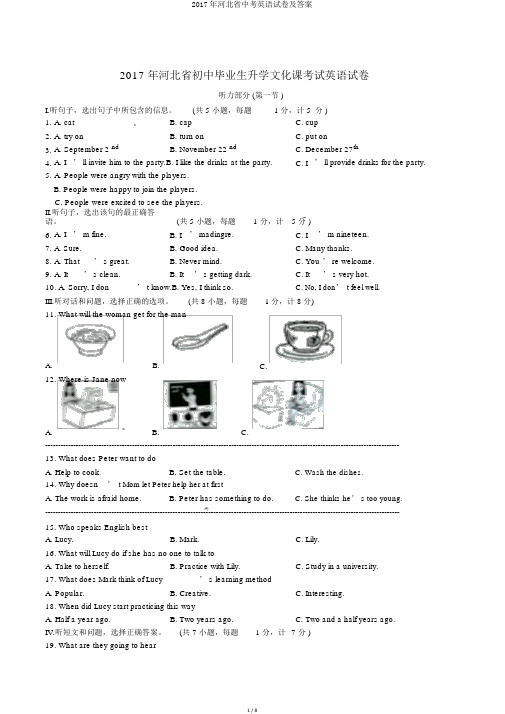
2017 年河北省初中毕业生升学文化课考试英语试卷听力部分 (第一节 )I.听句子,选出句子中所包含的信息。
(共 5 小题,每题1分,计 5 分 )1. A. cat B. cap C. cup2. A. try on B. turn on C. put on3. A. September 2 nd B. November 22 nd C. December 27th4. A. I ’ ll invite him to the party.B. I like the drinks at the party. C. I ’ ll provide drinks for the party.5. A. People were angry with the players.B. People were happy to join the players.C. People were excited to see the players.II.听句子,选出该句的最正确答语。
(共 5 小题,每题 1 分,计 5 分 )6. A. I ’ m fine. B. I ’ madingre. C. I ’ m nineteen.7. A. Sure. B. Good idea. C. Many thanks.8. A. That ’ s great. B. Never mind. C. You ’ re welcome.9. A. It ’ s clean. B. It ’ s getting dark. C. It ’ s very hot.10. A. Sorry, I don ’ t know.B. Yes, I think so. C. No, I don’ t feel well.III.听对话和问题,选择正确的选项。
(共 8 小题,每题1分,计 8分)11. What will the woman get for the manA. B. C.12. Where is Jane nowA. B. C.-------------------------------------------------------------------------------------------------------------------------------------------13. What does Peter want to doA. Help to cook.B. Set the table.C. Wash the dishes.14. Why doesn’ t Mom let Peter help her at firstA. The work is afraid home.B. Peter has something to do.C. She thinks he’ s too young.-------------------------------------------------------------------------------------------------------------------------------------------15. Who speaks English bestA. Lucy.B. Mark.C. Lily.16. What will Lucy do if she has no one to talk toA. Take to herself.B. Practice with Lily.C. Study in a university.17. What does Mark think of Lucy ’ s learning methodA. Popular.B. Creative.C. Interesting.18. When did Lucy start practicing this wayA. Half a year ago.B. Two years ago.C. Two and a half years ago.IV.听短文和问题,选择正确答案。
河北中考英语复习 动词的时态和语态练习题附答案

C. have compared
D. were comparing
28. I don’t know the history about cars. So I ___C_____ some
information on the Internet.
A. search
B. searched
C. will search
1. 根据时间状语确定时态(2019.76,2017.80) 特定的时间状语往往标志着特定的时态,河北中考对这一角度
的考查主要体现在词语运用题型中。句中已经给出了明显的时间 状语,只要考生牢记这些时间标志词所对应的时态,在答题时就 会游刃有余。 例 Susan has already ________(achieve) her dream to be a teacher. She teaches English in her hometown now. 【方法点拨】 根据already可知应用现在完成时。故填achieved。
remember it now.
A. tells
B. will tell
C. told
D. is telling
5. (2019河北34题)Sorry, I didn’t see you, because I ____C____ a
picture.
A. draw
B. drew
C. was drawing
experiment in the lab.
A. helps
B. is helping
C. helped
D. was helping
32. Linda ___A_____ to ride a bike to school. She thinks it is a good
2017年河北省中考英语试卷附答案解析[Word版](可编辑修改word版)
](https://img.taocdn.com/s3/m/5fc736a527d3240c8547ef76.png)
河北省 2017 年中考英语试卷笔试部分V.单项选择(共 10 小题,每小题 1 分,计 10 分)先出可以填入空白处的最佳选项。
26.---Is this Kate’s bicycle?---No, is under the tree. She put it there this morning.A. hisB. hersC. mineD. yours答案 B,考查名词性物主代词。
Hers =her bicycle。
27.Just walk down this road and you’ll see the museum your right.A. onB. inC. atD. by答案 A. 考查介词。
表达在左边或右边,用介词 on。
28.Eating dumplings at the Spring Festival is in China.A. patientB. luckyC. possibleD.traditional答案 D。
考查形容词。
句意: 在中国,春节时吃饺子是传统的。
A 耐心的, B 幸运的,C 可能的,D 传统的。
29.Grandfather lives with us. We all him.A. look atB. look forC. look afterD. look like答案 C。
考查动词短语。
句意:爷爷和我们一起住,我们都照顾他。
A 看, B 寻找,C 照顾,D 看起来像。
30.I have travelled a lot. I speak four languages.A. canB. mayC. mustD. need答案 A. 考查表示能力的情态动词。
句意:我经常旅游。
我能说四门语言。
31.Don’t take the dictionary away. I it.A. useB. usedC. am usingD. have used答案 C。
考查时态。
- 1、下载文档前请自行甄别文档内容的完整性,平台不提供额外的编辑、内容补充、找答案等附加服务。
- 2、"仅部分预览"的文档,不可在线预览部分如存在完整性等问题,可反馈申请退款(可完整预览的文档不适用该条件!)。
- 3、如文档侵犯您的权益,请联系客服反馈,我们会尽快为您处理(人工客服工作时间:9:00-18:30)。
中考时态考点梳理动词时态是各地中考试题中必考的知识点,也是考查的重点。
然而,初中英语时态多达八种,并且近几年中考在考查时态时,形式灵活多样,尤其是我们河北省近几年的中考,多体现在上下文语境中,这样无形中就增加了试题的难度,使得一些考生总感觉时态题不可捉摸,无规律可循。
其实,你只要弄清楚了时态题的命题方法和解题方法,也就不难了。
一、巧抓时间标志词,快解时态题由于绝大多数的中考英语试卷同时具有毕业检测与升学选拔的双重功效,所以对时态的考查在很大程度上还是停留在识记和简单应用的层次上。
为此,命题人在命题时,往往会借助一些关键的时间标志词来给考生以解题的“暗示”。
所以,同学们在解题时,应该抓住关键“时间类标志词”,从而达到快解时态题的“神效”。
【中考例题】1. (2015陕西) Many city people ______ their bikes to work every day.A. rideB. will rideC. rodeD. have ridden2. (2015武汉) —A nice car! Is it yours?—No, it isn’t. I ______ it from a friend of mine two days ago.A. borrowB. have borrowedC. will borrowD. borrowed3. (2015黄石) The writer and speaker ______ a speech on Chinese culture in the hall now.A. are givingB. is givingC. will giveD. has given4. (2015齐齐哈尔) Alice ______ for the bus at seven yesterday morning.A. waitedB. was waitingC. is waitingD. will wait5. (2015福州) So far, the AIIB (亚投行) ______ 57 countries to be the founding members.A. attractedB. has attractedC. will attractD. is attracting6. (2015龙东) By the time I got back to school, the bell ______.A. rangB. has rungC. had rungD. will ring7. (2015抚顺) —Why are you so happy? —My friend ______ me next month.A. visitsB. was visitingC. will visitD. visited【知识锦囊】【应试对策】中考测试动词时态必须与句中时间状语一致时,常在题干中加入具体的交际情景,以测试学生对动词时态知识的实际运用能力。
因此,同学们要敏锐捕捉句中的时间标志词,并且结合具体的语境,来确定动词的时态。
二、巧抓主从句时态的呼应,快解时态题考查主从句时态的呼应是各地中考命题的特点,特别是将其放在比较真实的语境中进行考查。
有时,命题者为了增加试题的难度,还会将两种从句进行糅合,来考查学生对时态的辨析能力。
【中考例题】8. (2015潍坊) Next month we’re going somewhere as soon as the holiday ______.A. will beginB. has begunC. beginsD. is beginning9. (2015孝感) We will go to Tian’anmen Square to watch the raising of national flag if it______ tomorrow.A. will rainB. rainsC. doesn’t rainD. won’t rain10. (2015南充) We don’t know when ______ next week. Please call me when he arrives.A. will he arriveB. does he arriveC. he will arriveD. he arrives11. (2015无锡) Too many people were absent. The chairperson warned that he ______ themeeting if necessary.A. would cancelB. cancelledC. would startD. started12. (2015雅安) The teacher told us that the sun ______ in the east.A. had risenB. has risenC. roseD. rises【应试对策】在根据时态呼应原则解题时,要把握好以下两点:1. 在由when,before,after,until,as soon as引导的时间状语从句以及由if,unless,as long as引导的条件状语从句中,常用一般现在时表将来。
2. 解答宾语从句与主句时态呼应题时,我们应熟知一下规则:如果主句的谓语动词是一般现在时,从句的谓语动词可根据需要,选用相应的时态;如果主句的谓语动词是过去时,宾语从句的谓语动词选用过去时态的某一种形式;如果宾语从句叙述的是客观事实、普遍真理、自然现象或是习惯性动作等,不管主句用什么时态,从句都用一般现在时。
三、巧抓试题的语境,快解时态题对着课改的深入和中考命题手法的不断创新,近年来中考试题对时态考查的要求也越来越高,大部分试题趋向情境化。
这就对学生的语言基本功和语言运用的能力提出了较高的要求。
【中考例题】13. (2015菏泽) —Hi, Wang Ning! How’s the weather in Heze now?—It is terrible. It ______ all the morning.A. rainsB. is rainingC. rainD. would rain14. (2015南京) —When will Uncle Sam come to see us?—He’ll visit us this weekend. He ______ me that by e-mail.A. toldB. is toldC. will tellD. was going to tell15. (2015江西) —Do you have any plans for tonight?—Yes, I ______ at the new Italian restaurant in town.A. eatB. have eatenC. ateD. am going to eat16. (2015江西) —Ben and Sue aren’t home, aren’t they?—No. They ______ to London on business.A. have goneB. goC. have beenD. will go【应试对策】想要准确地解答语境题型时态题,首先要通读试题,认真领悟语境,来捕捉有效地解题信息。
在此基础上,可以快速剔除两个最弱的干扰项。
接着再结合语境,综合运用所学的时态方面的知识,对剩下的两个选项进行比较,最终确定最佳答案。
四、中考对各种时态的考查第一组:一般现在时一般现在时常用来描述经常出现、反复发生的动作或存在的状态,句子常带有特定的状语(如every day, always, often, sometimes, seldom, usually, nowadays等)。
此外,在陈述客观事实或客观真理时,也常用一般现在时。
此外,在含有时间、条件等状语从句的复合句中,当主句为一般将来时时,时间、条件等状语从句中的谓语动词用一般现在时表示将来。
【中考例题】17. (2014北京) —What do you often do at weekends?—I often ______ my grandparents.A. visitB. visitedC. have visitedD. will visit18. (2014温州) Alice likes doing housework. She ______ her room every afternoon.A. cleansB. cleanedC. is cleaningD. has cleaned19. (2014武汉) —Do you know if Jack will drive to London this weekend?—Jack? Never! He ______ driving so far.A. has hatedB. will hateC. hatedD. hates20. (2014上海) Aunt Lucy will tell us something about her trip to Australia when she ___ back.A. cameB. comesC. would comeD. will come21. (2014广东) —I wonder whether Brazil will win the match later tonight.—Go to bed first. I will wake you up as soon as the match ______.A. startsB. startedC. will startD. is starting22. (2014东营) Eating and drinking on Beijing subway is not allowed. If you ______ the rule,you’ll face a fine (罚款) of up to 5000 yuan.A. brokeB. breakC. will breakD. have broken23. (2014滨州) —Do you know if he will come tomorrow?—No, but if he ______, I’ll call you to have a meal together.A. will comeB. won’t comeC. comesD. doesn’t come第二组:一般过去时一般过去时表示在过去的某时或一段时间内发生的动作或存在的状态,通常与yesterday, the day before yesterday, last week / month / year, the other day, just now, two days ago, at that time, in 2012等时间状语连用。
